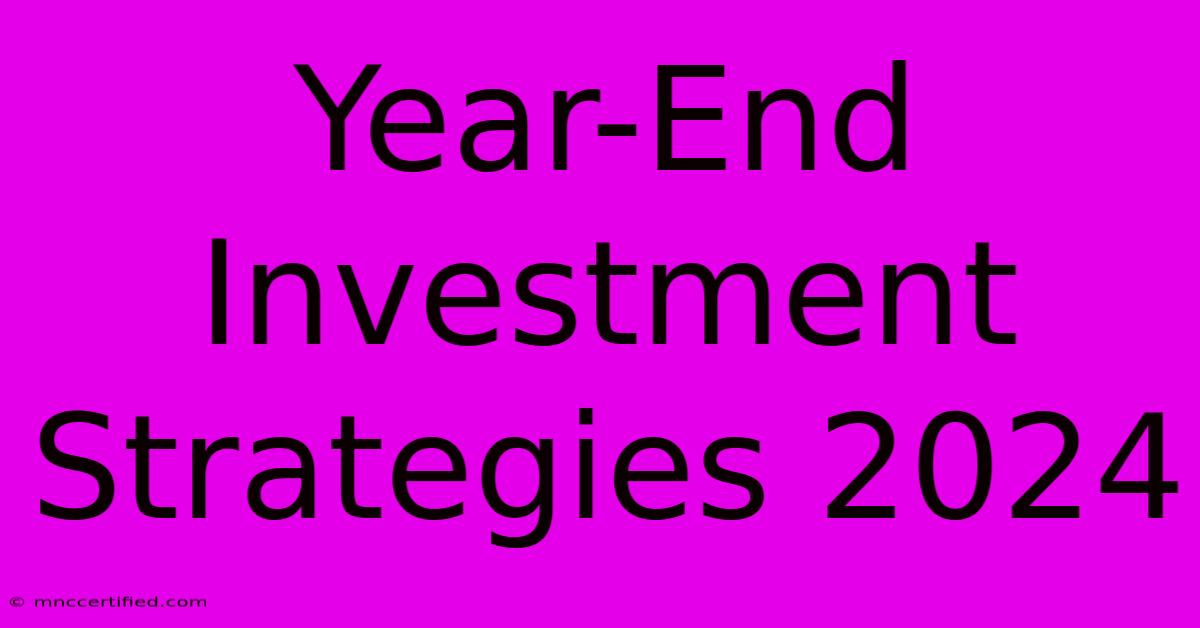Year-End Investment Strategies 2024

Table of Contents
Year-End Investment Strategies 2024: Maximize Your Returns
As 2024 draws to a close, it's crucial for investors of all levels to strategize their year-end moves to optimize their portfolios and potentially maximize tax benefits. This guide will explore key year-end investment strategies to consider, helping you navigate the complexities of the market and position yourself for a successful 2025.
Understanding Your Investment Goals
Before diving into specific strategies, it's vital to clearly define your investment goals. Are you aiming for long-term growth, short-term gains, or a balance of both? Your time horizon significantly impacts the types of investments you should consider. For example, long-term investors might prioritize growth stocks, while those seeking quicker returns might explore more volatile options. Knowing your risk tolerance is equally important. Are you comfortable with potential losses in pursuit of higher returns, or do you prefer a more conservative approach?
Tax-Advantaged Investment Strategies
Year-end planning often revolves around tax optimization. Several strategies can help minimize your tax liability:
Tax-Loss Harvesting:
This strategy involves selling investments that have lost value to offset capital gains realized during the year. This can significantly reduce your tax burden. However, remember the wash-sale rule, which prohibits repurchasing substantially identical securities within 30 days of the sale. Consult a financial advisor to ensure you're following the regulations correctly. Tax-loss harvesting is a powerful tool but requires careful planning.
Maximize Retirement Contributions:
If you haven't maxed out your contributions to 401(k)s, IRAs, or other retirement accounts, now's the time to do so. These contributions offer significant tax advantages, reducing your taxable income for the current year. Understanding the contribution limits for 2024 is crucial. Check the IRS website for the most up-to-date information. Don't miss out on these valuable tax breaks!
Donate to Charity:
Charitable donations can offer tax deductions, depending on your tax bracket. Donating appreciated securities instead of cash can provide even greater tax benefits, as you avoid paying capital gains taxes on the appreciated value. Consult a tax professional to understand the implications and optimize your charitable giving strategy.
Investment Strategies Based on Market Conditions
Market conditions significantly impact investment decisions. Analyzing current economic indicators, interest rates, and geopolitical events is essential. However, predicting market movements with certainty is impossible. Instead, focus on diversification and a long-term perspective.
Diversification:
Don't put all your eggs in one basket. Diversifying your portfolio across different asset classes (stocks, bonds, real estate, etc.) can help mitigate risk and potentially improve returns over the long term. Consider adjusting your portfolio allocation based on your risk tolerance and market conditions.
Rebalancing:
Rebalancing your portfolio involves adjusting your asset allocation to bring it back to your target percentages. Over time, some investments may outperform others, causing your portfolio to drift from your initial allocation. Rebalancing helps to maintain your desired level of risk. Regular rebalancing, especially at year-end, is a cornerstone of effective portfolio management.
Consider Bonds:
While stocks often take center stage, bonds play a crucial role in portfolio diversification. Bonds generally offer lower returns than stocks but also less volatility. Including bonds in your portfolio can help reduce overall risk and provide stability, particularly during periods of market uncertainty.
Beyond Investments: Financial Planning
Year-end is also an opportune time to review your overall financial plan. This includes:
- Budget Review: Analyze your spending habits and identify areas for potential savings.
- Debt Management: Explore strategies to reduce high-interest debt, improving your overall financial health.
- Estate Planning: Review your will, trust, and other estate planning documents to ensure they align with your current circumstances.
Conclusion: A Proactive Approach
Effective year-end investment strategies require proactive planning and a clear understanding of your financial goals. By carefully considering tax optimization, portfolio diversification, and market conditions, you can position yourself for a more successful investment journey in 2025. Remember to consult with qualified financial and tax professionals for personalized advice tailored to your specific circumstances. Don't delay – start planning your year-end investment strategies today!
Disclaimer: This article is for informational purposes only and does not constitute financial or investment advice. Consult with a qualified financial advisor before making any investment decisions.

Thank you for visiting our website wich cover about Year-End Investment Strategies 2024. We hope the information provided has been useful to you. Feel free to contact us if you have any questions or need further assistance. See you next time and dont miss to bookmark.
Featured Posts
-
Skipper Insurance Jackson Al
Nov 30, 2024
-
607 Ca Dollars To Us Dollars
Nov 30, 2024
-
Ault Alliance Stock Forecast
Nov 30, 2024
-
Street Legend Faces More Trauma
Nov 30, 2024
-
Brandon Wood Insurance Agent
Nov 30, 2024